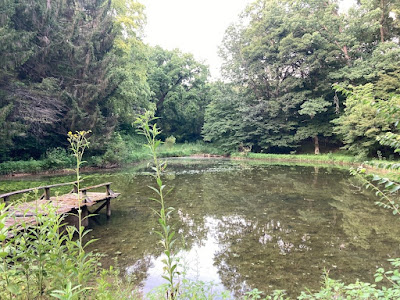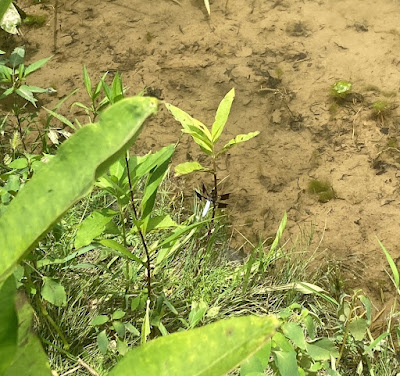Sections below are the following:
Transcript of Audio
Audio Notes and Acknowledgments
Images
Sources
Related Water Radio Episodes
For Virginia Teachers (Relevant SOLs, etc.)
Unless otherwise noted, all Web addresses mentioned were functional as of 8-4-23.
TRANSCRIPT OF AUDIO
From the Cumberland Gap to the Atlantic Ocean, this is Virginia Water Radio for the weeks of August 7 and August 14, 2023.
MUSIC – ~27 sec – Lyrics: “I’m gonna soak up the sun, I’m gonna dry out the river, I’m gonna run to the shimmering pond, until the summer comes….”
That’s part of “Until the Summer Comes,” by the Harrisonburg and Rockingham County, Va.-based band, The Steel Wheels. It sets the stage for this episode’s exploration of what one may hear and see when the summer comes to a southwestern Virginia pond on a hot July day. On July 27, 2023, I visited a Blacksburg pond to listen and watch at four times during the day. Have a listen for about 80 seconds to an audio post card of that pondside day and see what creatures you recognize. Short breaks in the audio separate recordings at sunrise, mid-day, and sunset.
SOUND – ~83 sec
Some of the sounds you heard were a Louisiana Waterthrush
beside the pond’s outlet stream at sunrise; melodic Wood Thrushes at sunrise
and sunset; a Belted Kingfisher at midday; and, as the day was ending, the
buzzing of cicadas, the croaking trills of Gray Tree Frogs, the chittering of
Chimney Swifts, and the eerie whistles of a Screech Owl. Throughout most of the day one could also
hear various other birds, such as cardinals, crows, and towhees, along with the
occasional “thunk” of a Green Frog.
Other sights of the day included a
Great Blue Heron flying away from the pond at sunrise and returning at sunset;
Cedar Waxwings feeding on pond insects; dragonflies and damselflies mating and
defending territories; water striders skating on the pond surface; a slow-moving
Snapping Turtle; and what might have been a mink diving into the pond’s outlet
stream.
The small but information-rich book, A Golden Guide to Pond Life, notes that the various kinds of natural and human-constructed ponds have, quote, “ceaseless activity” in spring and summer, and that thousands of plants and animals live in or near ponds, lakes, and streams. While the summer’s still here, I hope you have time to explore a pond or some other aquatic world.
Thanks to The Steel Wheels for permission to use this episode’s music, and we close with about 25 more seconds of “Until the Summer Comes.”
MUSIC – ~27 sec – Lyrics: “…until the summer comes.”
SHIP’S BELL
Virginia Water Radio is produced by the Virginia Water Resources Research Center, part of Virginia Tech’s College of Natural Resources and Environment. For more Virginia water sounds, music, or information, visit us online at virginiawaterradio.org, or call the Water Center at (540) 231-5624. Thanks to Ben Cosgrove for his version of “Shenandoah” to open and close this episode. In Blacksburg, I’m Alan Raflo, thanking you for listening, and wishing you health, wisdom, and good water.
AUDIO NOTES AND ACKNOWLEDGEMENTS
“Until the Summer Comes,” from the 2013 album “No More Rain,” is copyright by The Steel Wheels, used with permission. More information about The Steel Wheels is available online at http://www.thesteelwheels.com/. This music was used previously by Virginia Water Radio in Episode 569, 3-22-21.
This episode’s sounds were recorded by Virginia Water Radio beside a pond at a private residence in Blacksburg, Va., on July 27, 2023.
Virginia Water Radio thanks Virginia Water Resources Research Center Director Stephen Schoenholtz for his help with this episode.
Click here if you’d like to hear the full version (2 min./22 sec.) of the “Shenandoah” arrangement/performance by Ben Cosgrove that opens and closes this episode. More information about Mr. Cosgrove is available online at http://www.bencosgrove.com.
IMAGES
Pond view at about 6:28 a.m.
Pond view at 8:05 p.m. 
Water strider at 12:47 p.m. 
Dragonfly at 12:50 p.m.
SOURCES
Used for Audio
George K. Reid, Pond Life (Golden Guide®), as revised by Jonathan P. Latimer et al., St. Martin’s Press, New York, N.Y., 2001 (the “ceaseless activity” quote and the other information that the audio mentioned from this source were taken from pages 4, 5, 8, and 9.).
For More Information about Ponds
Let’s Talk Science (Canada), “Introduction to Lakes & Ponds,” online at https://letstalkscience.ca/educational-resources/backgrounders/introduction-lakes-ponds.
New Hampshire PBS, “NatureWorks/Ponds,” online at https://nhpbs.org/natureworks/nwep7b.htm.
Virginia Department of Wildlife Resources, “Private Pond Management,” online at https://dwr.virginia.gov/fishing/private-pond-management/. According to this source as of August 6, 2023, there are an estimated 80,000 ponds in Virginia.
RELATED VIRGINIA WATER RADIO EPISODES
All Water Radio episodes are listed by category at the Index link above (http://www.virginiawaterradio.org/p/index.html). See particularly the following three subject categories; “Amphibians”; “Birds”: and “Rivers, Streams, and Other Surface Waters.”
The Louisiana Waterthrush was featured in Episode
520, 4-13-20.
Following are links to some other episodes related to ponds.
Episode 82, 10-3-11 –
an introduction to ponds.
Episode
309, 3-28-16 – ponds as the setting for exploring temperature in animals.
Episode
381, 8-14-17 – ponds as two of six water locations for sound recordings at
midnight.
Episode 404, 1-22-18 – ice on
ponds.
FOR VIRGINIA TEACHERS – RELATED STANDARDS OF LEARNING (SOLs) AND OTHER INFORMATION
Following are some Virginia Standards of Learning (SOLs) that may be supported by this episode’s audio/transcript, sources, or other information included in this post.
2020 Music SOLs
SOLs at various grade levels that call for “examining the relationship of music to the other fine arts and other fields of knowledge.”
2018 Science SOLs
Grades K-4: Living
Systems and Processes
2.5 – Living things are part of a system.
3.5 – Aquatic and terrestrial ecosystems support a diversity
of organisms.
4.3 – Organisms, including humans, interact with one another
and with the nonliving components in the ecosystem.
Grades K-5: Earth and
Space Systems
3.7 – There is a water cycle and water is important to life
on Earth.
Grades K-5: Earth Resources
4.8 – Virginia has important natural resources.
Grade 6
6.6 – Water has unique physical properties and has a role in
the natural and human-made environment.
6.8 – Land and water have roles in watershed systems.
Life Science
LS.5 – Biotic and abiotic factors affect an ecosystem.
LS.6 – Populations
in a biological community interact and are interdependent.
LS.8 – Change occurs in ecosystems, communities,
populations, and organisms over time.
Virginia’s SOLs are available from the Virginia Department of Education, online at https://www.doe.virginia.gov/teaching-learning-assessment/instruction
Following are links to Water Radio episodes (various topics) designed especially for certain K-12 grade
levels.
Episode 255, 3-2-15 – on density, for 5th and 6th grade.
Episode 282, 9-21-15 – on living vs. non-living, for kindergarten.
Episode 309, 3-28-16 – on temperature regulation in animals, for kindergarten through 12th grade.
Episode 333, 9-12-16 – on dissolved gases, especially dissolved oxygen in aquatic habitats, for 5th grade.
Episode 404, 1-22-18 – on ice on ponds and lakes, for 4th through 8th grade.
Episode 407, 2-12-18 – on snow chemistry and physics, for high school.
Episode 483, 7-29-19 – on buoyancy and drag, for middle school and high school.
Episode 524, 5-11-20 – on sounds by water-related animals, for elementary school through high school.
Episode 531, 6-29-20 – on various ways that animals get water, for 3rd and 4th grade.
Episode 539, 8-24-20 – on basic numbers and facts about Virginia’s water resources, for 4th and 6th grade.
Episode 606, 12-6-21 – on freezing and ice, for kindergarten through 3rd grade.
